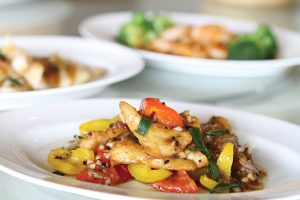Have A Happy Chinese New Year
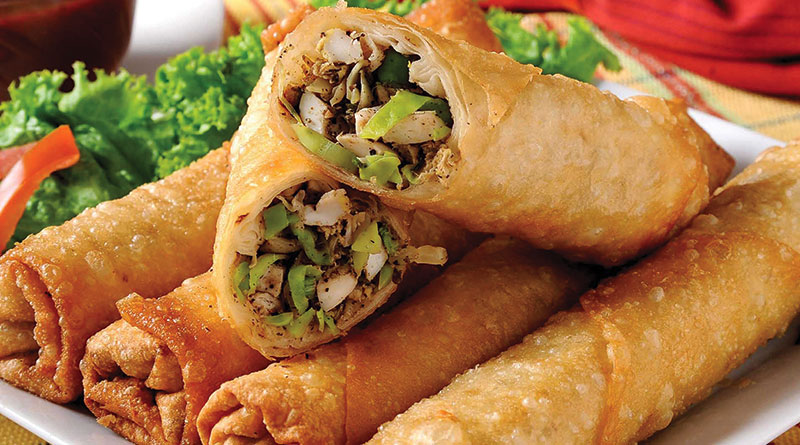
Chinese New Year, perhaps the most widely celebrated holiday in the world, is coming soon, and Britain is gearing up to host some of the largest Chinese New Year celebrations outside of Asia.
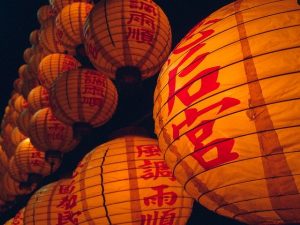 Events include celebrations in Liverpool, parades in Manchester, festivals and performances in Birmingham and Leeds to a street parade from Charing Cross to Chinatown in London!
Events include celebrations in Liverpool, parades in Manchester, festivals and performances in Birmingham and Leeds to a street parade from Charing Cross to Chinatown in London!
Last year research by VisitBritain revealed that bookings from China to the UK were up 24% for the Chinese New Year, compared to the previous year. Furthermore, more than 700,000 people in London alone celebrated the Chinese New Year, illustrating the popularity of the event. Additionally, 349,000 people come to the UK specifically for the celebrations in the UK – spending around £722m in the process.
So, what better way to for the hospitality and on-trade sector to prolong the excitement of the holiday season than to celebrate another new beginning? This 25 January heralds the Chinese New Year, and the start of the Year of the Rat. Year of the Rat and falls between 24th January (New Year’s Eve) and 7th February, with New Year’s Day falling on 25th January.
The Rat
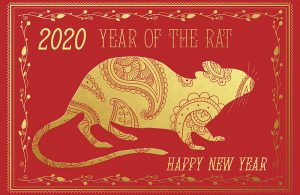 The Rat is the first of all zodiac animals. According to one myth, the Jade Emperor said the order would be decided by the order in which they arrived to his party. The Rat tricked the Ox into giving him a ride. Then, just as they arrived at the finish line, Rat jumped down and landed ahead of Ox, becoming first.
The Rat is the first of all zodiac animals. According to one myth, the Jade Emperor said the order would be decided by the order in which they arrived to his party. The Rat tricked the Ox into giving him a ride. Then, just as they arrived at the finish line, Rat jumped down and landed ahead of Ox, becoming first.
The Rat is also associated with the Earthly Branch (地支—dì zhī) Zi (子) and the midnight hours. In the terms of yin and yang (阴阳—yīn yáng), the Rat is yang and represents the beginning of a new day.
In Chinese culture, rats were seen as a sign of wealth and surplus. Because of their reproduction rate, married couples also prayed to them for children.
• Men born in the Rat year are clever and adapt quickly to new environments. They are creative great at taking advantage of opportunities. However, they sometimes lack the courage to do so. Although they have great ideas, they might not be suitable for leadership positions.
• Women born in the Rat year are the traditional women. They love keeping things organized and place great value on the family. Everything is taken care of by them and there is no need for their husband to worry. Outside of home, they’re also someone with a sense of responsibility and ability.
A Growing Calendar Event
Once overlooked in favour of traditional British fare, international cuisine is not only well established in the UK today, but it’s also gaining rapid traction with consumers. The nation’s growing appetite for travel in the Far East has meant British tastes are becoming far more eclectic, with world foods and Oriental dishes now an established part of the British food and drink scene, whilst also prominent in many supermarkets.
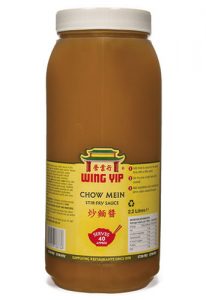 Wing Yip Director Ennevor Yap says: “Historically, consumers were more familiar with a Westernised take on Oriental cuisine. However, increased media coverage is encouraging them to think more about the source of their food, with trends for more authentic cuisine continuing to develop and consumers putting more time and research into the dishes they eat.
Wing Yip Director Ennevor Yap says: “Historically, consumers were more familiar with a Westernised take on Oriental cuisine. However, increased media coverage is encouraging them to think more about the source of their food, with trends for more authentic cuisine continuing to develop and consumers putting more time and research into the dishes they eat.
“People are travelling further afield, looking to recreate holiday favourites on their return to the UK. TV chefs are championing authentic, exotic dishes and consumers are becoming far more interested in new flavours. These factors combined are putting international cuisine well and truly on British menus.
“With this in mind, Chinese New Year creates an opportunity that catering operators can capitalise on, by expanding their Oriental food offering and appealing to today’s consumers. Whether in the form of one or two additional dishes added to an established offering, or as an entire bespoke Chinese-themed menu, Chinese New Year should encourage operators to get creative, providing new taste experiences for returning trade, and targeting new customers looking for more variety to at mealtimes.”
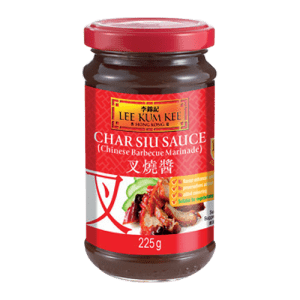 Annette Coggins, head of foodservice at Tilda UK, said: “After the Christmas festivities we often see a drop in footfall and Chinese New Year is perfectly placed to bring some good fortune to operators by providing consumers with a reason to go out and celebrate. As Chinese cuisine continues to win over the hearts of the nation, the benefits of joining in the festivities are clear to see.”
Annette Coggins, head of foodservice at Tilda UK, said: “After the Christmas festivities we often see a drop in footfall and Chinese New Year is perfectly placed to bring some good fortune to operators by providing consumers with a reason to go out and celebrate. As Chinese cuisine continues to win over the hearts of the nation, the benefits of joining in the festivities are clear to see.”
Annette says that simply adding a selection of Chinese dishes to menus will allow pubs to take advantage of the festivities – and they should also look to premiumise dishes to improve profit margin.
Chinese families feast for the first 15 days of the year, every day comes with its own special tradition with food at the heart.
Lee Kum Kee Chinese sauce brand is inviting consumers to share in these ancient Chinese traditions, exploring the greatest celebration of food and discovering new and delicious authentic Chinese flavours that will inspire dishes throughout the year.
Chinese New Year Traditions :
The Lunar New Year’s Eve, 24th January 2020
This is a time of cleansing and ridding oneself of the bad luck from the previous year to make room for the good luck the new year will bring. Good fortune in the form of money is exchanged from the older generation to the younger and it is customary to stay up all night with firecrackers forming the night’s entertainment.
Chicken is always at the Chinese festive celebration tables. It can come in different cooking methods such as steamed chicken, soya chicken, or roast chicken (but fried in a different way).
Fish is eaten as the main part of the meal; fish also symbolises having a surplus at the end of the year. If there is still something to be eaten at the end of the year this means there is more to come in the new year ahead.
Dumplings are also a traditional dish in certain part of China on the Chinese New Year’s Eve celebration as they symbolise the exchange of the past year to the new, and with it the bringing of wealth.
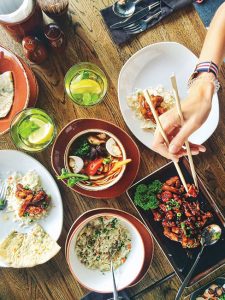 The Lunar New Year ( First Day), 25th January 2020
The Lunar New Year ( First Day), 25th January 2020
The Chinese New Year is spent with family, traditionally the paternal side of the family for a reunion feast. On this day, sweeping the house is not recommended as this symbolises driving the good fortune for the year out of the home.
A big feast is prepared for Chinese New Year’s Day, with an array of meats and fish adorning the table. However, for those practising Buddhism, a vegan feast is prepared as this symbolises the presence of life in the new year. Some Chinese families are still keeping the tradition of having the first dinner in Chinese New Year a vegetarian dinner.
The 3rd day in Lunar Calendar, 27th January 2020
The third day is called the “red mouth day” which means “the argument day”. Hence, most families will stay home avoiding visits to friends just trying to avoid having arguments with friends during Chinese New Year. But this tradition is slowly being forgotten and not abide in modern days.
The 4th day in Lunar Calendar, 28th January 2020
The fourth day is considered an auspicious day, a day to welcome the Kitchen God, the God of Fortune, and other Gods as they return from heaven to earth. It is a day to eat the leftovers from the previous feasts – much like the Western Boxing Day food tradition.
The 5th Day in Lunar Calendar, 29th January 2020
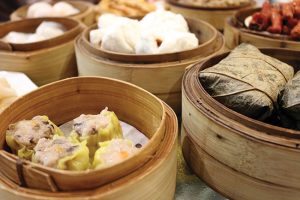 This day is believed to be the birthday of the God of Fortune, which is celebrated with another large feast that will last all night. During the evening the doors and windows are left open to welcome the God of Fortune and firecrackers are set off to attract his attention, ensuring good fortune for the year ahead.
This day is believed to be the birthday of the God of Fortune, which is celebrated with another large feast that will last all night. During the evening the doors and windows are left open to welcome the God of Fortune and firecrackers are set off to attract his attention, ensuring good fortune for the year ahead.
Dumplings are a big part of this day as they symbolise the old Chinese currency “Yuan Bao” which means “gold ingot” and they have similar shape.
The 8th Day in Lunar Calendar, 30th January 2020
This day is typically celebrated with colleagues as it is the day that businesses reopen. On the Lunar calendar, this day is the 8th and the word ‘eight’ has a similar pronunciation to ‘fortune’ in Chinese. This is celebrated with another feast that is laid on by the business. And, it is organized by the companies to have the business reopen lunch or dinner with their staff and/or workers.
The 15th Day in Lunar Calendar called “Yuan Xiao”, 8th February 2020
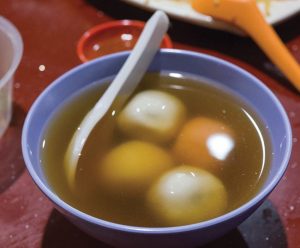 Chinese New Year celebrations draw to a close on “Yuan Xiao” which is also called the “Lantern Festival”. This day’s traditions date back to the Song dynasty where people would write poems and riddles on lanterns and those that solved them would receive a prize from the owner of the lantern. It was also a romantic time, when young men and women would meet. Therefore, it is also called the “Chinese Valentine’s Day”!
Chinese New Year celebrations draw to a close on “Yuan Xiao” which is also called the “Lantern Festival”. This day’s traditions date back to the Song dynasty where people would write poems and riddles on lanterns and those that solved them would receive a prize from the owner of the lantern. It was also a romantic time, when young men and women would meet. Therefore, it is also called the “Chinese Valentine’s Day”!
Glutinous rice balls with fillings would be eaten to celebrate and usher in a prosperous and lucky new year. And, these rice balls mostly come with sweet fillings such as black sesame seeds paste, red beans, lotus seeds paste,…etc.
And, on the 15th day, all lucky money (red packets) can be unsealed, and children can “reap” their “earnings” collected in the 15 days of Chinese New Year and bank in!
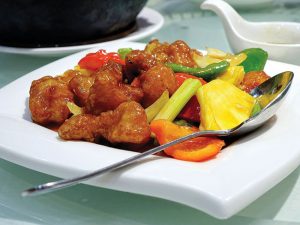 Maria Chong, Managing Director of Lee Kum Kee Europe Limited comments ‘There’s a real buzz around Chinese food at the moment and Chinese New Year is such a big opportunity for foodservice operatives who should be capitalising on this and maximising their sales with creative menu options, fusion flavours and most importantly traditional, quality ingredients. It’s key we inspire consumers and showcase the history, versatility and authenticity of Chinese food.”
Maria Chong, Managing Director of Lee Kum Kee Europe Limited comments ‘There’s a real buzz around Chinese food at the moment and Chinese New Year is such a big opportunity for foodservice operatives who should be capitalising on this and maximising their sales with creative menu options, fusion flavours and most importantly traditional, quality ingredients. It’s key we inspire consumers and showcase the history, versatility and authenticity of Chinese food.”
Chinese New Year is increasingly acknowledged worldwide, adds a Wing Yip Director Ennevor Yap, “And in the Year of the Rat many British consumers will be seeking ways to enjoy the festivities and experience the traditions associated with this special time of year in China. This encourages consumers to open their minds – and taste buds – to new flavours, providing operators with a platform to introduce or strengthen an Oriental offering.”
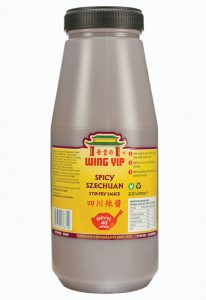 “Operators can use this trend to their advantage by providing traditional options using carefully sourced ingredients, taking a part in educating customers about the best Oriental dishes, while providing an exciting array of more unusual options. It’s a combination of the flavours, not just spiciness, which gives Oriental food its consumer appeal. This is gradually moving to a new level as contemporary operators develop more imaginative, varied and authentic concepts. Consumers are opting for flavour-bursting, chilli-infused dishes as they become more educated about different types of peppers and embrace a more nuanced approach to chillies. We have seen stir-fry ingredients such as Spicy Szechuan Sauce and Sriracha Sauce flying off the shelves as they increase in popularity.
“Operators can use this trend to their advantage by providing traditional options using carefully sourced ingredients, taking a part in educating customers about the best Oriental dishes, while providing an exciting array of more unusual options. It’s a combination of the flavours, not just spiciness, which gives Oriental food its consumer appeal. This is gradually moving to a new level as contemporary operators develop more imaginative, varied and authentic concepts. Consumers are opting for flavour-bursting, chilli-infused dishes as they become more educated about different types of peppers and embrace a more nuanced approach to chillies. We have seen stir-fry ingredients such as Spicy Szechuan Sauce and Sriracha Sauce flying off the shelves as they increase in popularity.
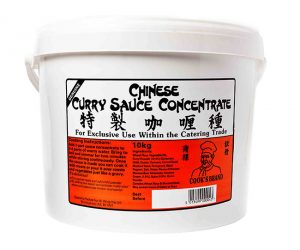 “The best strategy in trialling a new menu specific for Chinese New Year is to keep everything as simple as possible. Wing Yip sauces can be used to make speedy, delicious and authentic-tasting dishes, removing the time and cost of creating equivalent flavours from scratch. We recommend using our best-selling readymade sauces and condiments which are fast, convenience whilst still offering quality, authentic flavours. Our top products, like every year, remain the curry pastes. These include the Wing Yip Curry Concentrate Sauce, and also the Mai Siam range including their Thai Green Curry Paste, Red Curry Paste and Yellow Curry Paste.
“The best strategy in trialling a new menu specific for Chinese New Year is to keep everything as simple as possible. Wing Yip sauces can be used to make speedy, delicious and authentic-tasting dishes, removing the time and cost of creating equivalent flavours from scratch. We recommend using our best-selling readymade sauces and condiments which are fast, convenience whilst still offering quality, authentic flavours. Our top products, like every year, remain the curry pastes. These include the Wing Yip Curry Concentrate Sauce, and also the Mai Siam range including their Thai Green Curry Paste, Red Curry Paste and Yellow Curry Paste.
Don’t Forget the Decorations
According to legend, every year, the horrendous monster 年 (Nián) would terrorize villages. It would eat everything, from mosquitos to human beings. As time passed the villagers realised that the monster came every 365 days to wreak havoc before disappearing back into the forests.
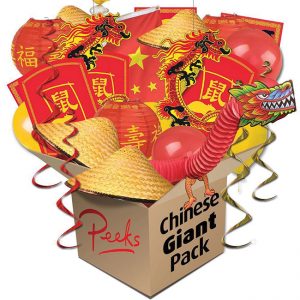 So the villagers decided that on that day, they would prepare a feast and dine before the ancestors for protection. After years of hiding like this, a youth came up with the idea to use firecrackers and scare the monster away once and for all.
So the villagers decided that on that day, they would prepare a feast and dine before the ancestors for protection. After years of hiding like this, a youth came up with the idea to use firecrackers and scare the monster away once and for all.
Such goes the legend of the origin of Chinese New Year. Since the purpose was to scare off Nian and prevent it from returning, the holiday decorations are typically a bright and loud red. The colour red is much loved by the Chinese generally as it represents happiness and good fortune.
Just because it’s January doesn’t mean the fun stops, says Nick Peek of Peeks, the Event Maker.
“If you were born in 2008, 1996, 1972 or 1960 you share something with everyone born in 2020 – the rat is your zodiac animal. The cycle comes around every dozen years, but whatever the creature is celebrated, the festival always goes off with a bang – literally.
“At Peeks we have all you need to join in; tableware, danglers and huge party packs – so you can enjoy taking part in celebrations that have been going on for several thousand years.
“While the Spring festival goes on for weeks in the East, January 25 is when the major celebrations will take off.”
Peeks The Event Makers – www.peeks.co.uk
Lee Kum Kee Europe – uk.lkk.com
Wing Yip – www.wingyip.com
TIPS FOR CHINESE NEW YEAR
1) Stock the right ingredients
Stocking and promoting the right ingredients is a key factor in maximising sales over the Chinese New Year period.
Have classic dishes such as:
• Stir fry soy noodles and mushrooms in oyster sauce
• Kung pao chicken
• Broccoli beef
• Fusion dishes
2) Story-telling to engage punters:
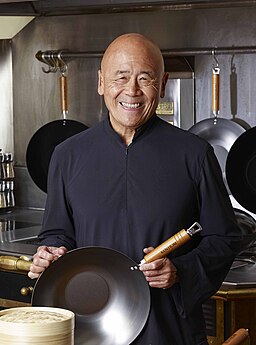
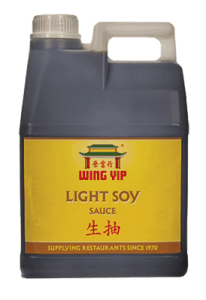 For example:
For example:
• Sesame oil is great for dressing, but doesn’t hold up well as a deep frying oil as the temperature tolerance is fairly low – like olive oil.
• Dark soy sauce is not meant for seasoning, and is mainly used for colouring.
• Meat used in stir-fries can be pre-marinated in oyster sauce making it flavoursome.
4) Be authentic
It is important for pubs to understand the local Chinese tastes while adapting it to the British palate at the same time.
Use products that provide chefs with the classic Chinese flavours, while offering the freedom and creativity to adjust the taste with other ingredients and develop their preferred flavour profile, the company says.
The Chinese New Year celebration is more than just a day. The Chinese community usually starts celebrating two weeks ahead. The celebration can last for another two weeks after January 24
Therefore, promotion or special menu offers should last for a month.
The Chinese New Year gathering is all about banqueting and food sharing, so instead of a la carte choices, a tasting menu could be offered, allowing people to try Chinese dishes they might not have experienced.
6) Expand oriental free-from options
People are looking for a broader array of meat-free and gluten-free menu options, and Chinese New Year should be no different.
The global gluten-free products market was valued at £11.58 billion in 2016 and is expected to grow by 9.3% from 2017 to 2025.

